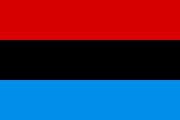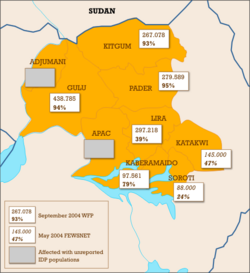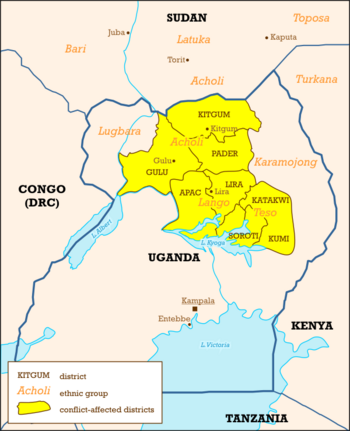Lord's Resistance Army
| Lord's Resistance Army | |
|---|---|
| Participant in the Lord's Resistance Army insurgency and Second Sudanese Civil War |
|
 Flag of the Lord's Resistance Army |
|
| Active | 1987-present |
| Leaders | Joseph Kony Vincent Otti† Raska Lukwiya† Okot Odhiambo Dominic Ongwen Odong Latek† |
| Headquarters | Northern Uganda |
| Strength | 500-3,000[1] |
| Originated as | Holy Spirit Movement Uganda People's Democratic Army |
| Allies | Sudan (1994-2002) |
| Opponents | |
The Lord's Resistance Army (LRA),[3] is a rebel sectarian guerrilla army operating mainly in northern Uganda and parts of Sudan.[4] It is designated a terrorist organization by The United States Department of State.[5]
The group was formed in 1987 and is engaged in an armed rebellion against the Ugandan government in what is now one of Africa's longest-running conflicts. It is led by Joseph Kony, who proclaims himself the "spokesperson" of God and a spirit medium, primarily of the Christian Holy Spirit which the Acholi believe can represent itself in many manifestations.[6] The group claims to be establishing a theocratic state based on the Ten Commandments and Acholi tradition.[6][7] The LRA is accused of widespread human rights violations, including murder, abduction, mutilation, sexual enslavement of women and children, and forcing children to participate in hostilities.[8]
Contents |
History and activities
Troop strength
The government of Uganda claims the LRA has only 500 or 1,000 soldiers in total, but other sources estimate that there could be as many as 3,000 soldiers, along with about 1,500 women and children.[1] The soldiers are organised into independent brigades of 10 or 20 soldiers.[1]
ICC arrest warrants

| Lord's Resistance Army insurgency |
|---|
 |
|
Events
1987–1994 |
|
Related articles
Lord's Resistance Army |
|
|
The International Criminal Court issued arrest warrants on 8 July and 27 September 2005 against Joseph Kony, his deputy Vincent Otti, and LRA commanders Raska Lukwiya, Okot Odhiambo and Dominic Ongwen. The five LRA leaders are charged with crimes against humanity and war crimes, including murder, rape, sexual slavery, and enlisting of children as combatants. The warrants were filed under seal; public redacted versions were released on 13 October 2005.[9] These were the first warrants issued by the ICC since it was established in 2002. Details of the warrants were sent to the three countries where the LRA is active: Uganda, Sudan and the Democratic Republic of the Congo (DRC). The LRA leadership has long stated that they would never surrender unless they were granted immunity from prosecution; so the ICC order to arrest them raised concerns that the insurgency would not have a negotiated end.[10]
On 30 November 2005 LRA deputy commander, Vincent Otti, contacted the BBC announcing a renewed desire among the LRA leadership to hold peace talks with the Ugandan government. The government expressed skepticism regarding the overture but stated their openness to peaceful resolution of the conflict.[11]
On 2 June 2006, Interpol issued five wanted person red notices to 184 countries on behalf of the ICC, which has no police of its own. Kony had been previously reported to have met Vice President of Southern Sudan Riek Machar Footage of this meeting can be viewed here http://www.journeyman.tv/56380/short-films/meeting-joseph-kony.html.[12] The next day, Human Rights Watch reported that the regional Government of Southern Sudan had ignored previous ICC warrants for the arrest of four of LRA's top leaders, and instead supplied the LRA with cash and food as an incentive to stop them from attacking southern Sudanese citizens.[13]
At least two of the five wanted LRA leaders have since been killed: Lukwiya on 12 August 2006[14] and Otti in late 2007.[15] Odhiambo was rumoured to have been killed in April 2008.[16]
See also
|
|
References
- ↑ 1.0 1.1 1.2 IRIN (2 June 2007). UGAND-SUDAN: Ri-Kwangba: meeting point . Accessed on 10 June 2008.
- ↑ ReliefWeb » Document » Guatemalan blue helmet deaths stir Congo debate
- ↑ The LRA has been known by a number of different names, including the Lord's Army (1987 to 1988) and the Uganda Peoples' Democratic Christian Army (UPDCA) (1988 to 1992) before settling on the current name in 1992. They are also sometimes referred to as Lord's Resistance Movement/Army (LRM/A or LRA/M). Some academics have included the LRA under the rubric Lakwena Part Two. For simplicity's sake, this article refers to all of these various manifestations as the "Lord's Resistance Army".
- ↑ JAMES C. MCKINLEY JR. (April 1, 1996). "Uganda's Christian Rebels Revive War in North", New York Times.
- ↑ Philip T. Reeker (December 6, 2001). "Statement on the Designation of 39 Organizations on the USA PATRIOT Act's �Terrorist Exclusion List�". U.S. Department of State.
- ↑ 6.0 6.1 Ruddy Doom and Koen Vlassenroot (1999). Kony's message: A new Koine? The Lord's Resistance Army in northern Uganda. 98. Oxford Journals / Royal African Society. p. 5-36.
- ↑ "Interview with Vincent Otti, LRA second in command" and " A leadership based on claims of divine revelations" in IRIN In Depth, June 2007
- ↑ International Criminal Court (14 October 2005). Warrant of Arrest unsealed against five LRA Commanders. Accessed on 10 June 2008.
- ↑ Situation in Uganda, International Criminal Court
- ↑ Court moves against Uganda rebels, BBC, 7 October 2005
- ↑ Ugandans welcome rebel overture, BBC, 30 November 2005
- ↑ Interpol push for Uganda arrests, BBC News, 2 June 2006
- ↑ Regional Government Pays Ugandan Rebels Not to Attack, Human Rights News, 3 June 2006
- ↑ International Criminal Court (7 November 2006). Statement by the Chief Prosecutor Luis Moreno‐Ocampo on the confirmation of the death of Raska LukwiyaPDF. Accessed on 10 June 2008.
- ↑ BBC News (23 January 2008). Uganda's LRA confirm Otti death. Accessed on 10 June 2008.
- ↑ BBC News (14 April 2008). Ugandan LRA rebel deputy 'killed' . Accessed on 10 June 2008.
External links
- Lord's Resistance Army, GlobalSecurity.org
- "A Case for National Reconcilation, Peace, Democracy and Economic Prosperity for All Ugandans", outlines and defends the LRA's political views.
- Invisible Children, advocacy group and documentary about LRA's child soldiers
- Situation in Uganda, International Criminal Court
- Uganda page, Internal Displacement Monitoring Centre
- Human Security in Northern Uganda project, University of British Columbia (extensive links from before mid-2004)
- Survey of War Affected Youth (SWAY): Research & Programs for Youth in Armed Conflict in Uganda
- Publications of the Refugee Law Project, Makerere University, periodic reports on human security and forced displacement in the north
- Radio France Internationale, LRA Dossier (in English)